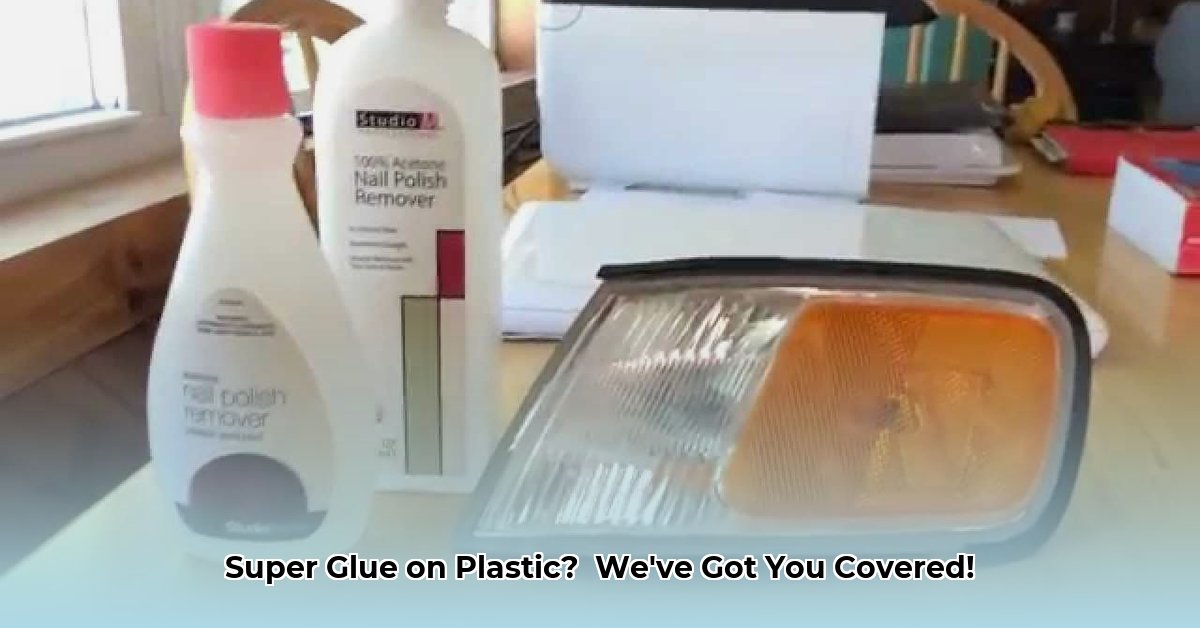Super glue: a miracle mender and a frustrating foe. Its incredible bonding power is unmatched, but that strength becomes a liability when it accidentally bonds with plastic. Whether it’s a stray drop on your favorite gadget or a full-blown crafting catastrophe, this guide provides a tiered approach to removing super glue from plastic, from everyday solutions to advanced techniques for the most stubborn mishaps.
Level 1: Gentle Solutions for Fresh Super Glue
These methods are ideal for recently applied super glue and gentler plastic types. Always start with the least aggressive method and work your way up as needed.
-
Soapy Water Soak: This simple solution is surprisingly effective for fresh super glue. Submerge the plastic item in warm, soapy water for 30-60 minutes. The combination of warmth and mild detergent helps break down the glue’s bond, making it easier to gently peel or rub away. For added effectiveness, incorporate a soft-bristled toothbrush or a non-abrasive sponge.
-
Oil Treatment: Olive oil, vegetable oil, or even petroleum jelly can soften super glue’s grip. Generously coat the affected area and let it sit for 1 hour or more. The oil penetrates and lubricates the glue, weakening its adhesion to the plastic. Gently wipe away the softened glue with a soft cloth or cotton swab.
-
Freezing for Brittleness: Cold temperatures can make super glue brittle and easier to remove. Place the plastic item in a sealed freezer bag and freeze for 1-2 hours. Once hardened, carefully chip away the glue with a plastic scraper or a blunt knife. Avoid using metal tools that can scratch the plastic. This method is particularly useful for larger spills.
Level 2: Solvents for Stubborn Super Glue
For more persistent super glue mishaps, consider these solvent-based approaches. Always test any solvent on an inconspicuous area first to ensure compatibility with the plastic.
-
Isopropyl Alcohol (Rubbing Alcohol): A milder solvent than acetone, isopropyl alcohol is a safer option for many plastics. Apply it with a cotton swab to the affected area, let it sit for several minutes, and then gently rub the softened glue away. Repeat as necessary. Isopropyl alcohol is an excellent choice for delicate plastics or when you’re unsure of the plastic type.
-
Acetone (Nail Polish Remover): Acetone is a powerful solvent capable of dissolving super glue effectively. However, it can also damage certain plastics, so proceed with caution. Test on a hidden area first. If safe, apply acetone sparingly to the glue with a cotton swab, avoiding the surrounding plastic. Allow it to sit briefly, then gently rub the softened glue away.
Level 3: Advanced Techniques and Professional Help
For exceptionally stubborn super glue or valuable plastic items, consider these advanced techniques or seek professional assistance.
-
Commercial Super Glue Removers: Specialized super glue removers contain solvents specifically formulated to dissolve cyanoacrylate, the main ingredient in super glue. Always follow the manufacturer’s instructions carefully, as these products can vary in strength and effectiveness.
-
Nitromethane (Extreme Caution): Nitromethane is a highly effective solvent, but it is also flammable and potentially hazardous to certain plastics. Exercise extreme caution if using this method, and follow safety precautions meticulously. This is generally a last resort for extremely stubborn glue and should be used with proper ventilation and protective gear.
-
Professional Assistance: For valuable, antique, or delicate plastic items, consider consulting a professional conservator or restoration specialist. They have the expertise and specialized tools to remove super glue safely and effectively without damaging the underlying material.
Preventing Future Sticky Situations
Prevention is always better than cure. Here are a few tips to avoid super glue mishaps in the future:
- Work in a Well-Ventilated Area: This helps dissipate fumes from solvents and improves safety.
- Protect Your Work Surface: Cover your work area with newspaper, cardboard, or a protective mat.
- Use Applicator Tips: Precision applicators or toothpicks allow for controlled glue application, minimizing the risk of spills.
- Wear Gloves: Protect your skin by wearing gloves when working with super glue and solvents.
- Store Super Glue Properly: Store super glue in a cool, dry place, away from children and pets.
By understanding your plastic type and the removal method’s potential impact, you can successfully remove super glue without causing damage. Remember to prioritize safety, test in a hidden area, and proceed with patience.
- Xbox 1 Games Not Loading? Try These Simple Troubleshooting Steps - February 23, 2026
- Xbox One Games Not Loading? Heres How to Fix It - February 22, 2026
- Fix Xbox Games Not Loading Issues on Your Console - February 21, 2026
